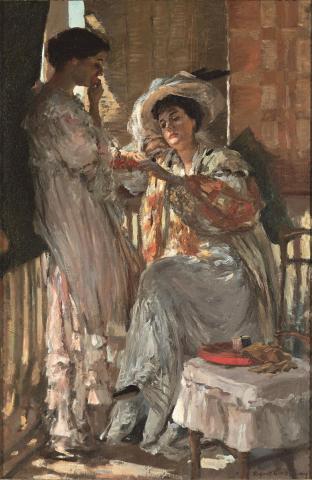CHERRIES, c.1908
RUPERT BUNNY
oil on canvas
79.5 x 52.0 cm
signed lower right: Rupert C. W. Bunny
Athenaeum Art Gallery, Melbourne
Sir James McCay, Melbourne, acquired from the above, July 1911
Thence by descent
Private collection, Melbourne
Christie's, Melbourne, 25 November 1997, lot 48
Private collection, Sydney
‘Days and Nights in August' by Rupert Bunny,
The Baillie Gallery, London,
22 April – 12 May 1911, cat. 15
Exhibition of Pictures by Rupert Bunny, Athenaeum Art Gallery, Melbourne, 24 July – 14 August 1911, cat. 34
‘Mr. Rupert Bunny's Exhibition of Pictures',
The Age, Melbourne, 24 July 1911, p. 11
Thomas, D., Rupert Bunny 1864-1947,
Lansdowne Press, Melbourne,
1970, p. 55, cat. O106
Compositional Study for 'Cherries', pencil
on paper, 21.1 x 13.8 cm (sheet), Villa Lili,
St. Georges Sketchbook, c1908–09, p. 65,
collection of the National Gallery of Victoria,
gift of the Rupert Bunny Estate 1948
In 1911, after twenty-seven years abroad, Rupert Bunny made a triumphal return to Australia, bringing with him one hundred paintings for exhibition in Melbourne and Sydney. Welcomed as a hero, his international awards were arrayed before an admiring public - first Australian artist to receive an honourable mention in the Société des Artistes Français; represented in the Musée du Luxembourg; exhibited in the leading Paris salons, London's Royal Academy, in Budapest, St Petersberg, Chicago and elsewhere. Hailed as'perhaps the most eminent painter that Australia has yet produced', the exhibition was said to be'the most interesting one-man show held in Melbourne for a long time'.1 Sales exceeded the amazing sum of £2,000. 2
Endormies, at 500 guineas one of two most highly priced paintings, was acquired by the National Gallery of Victoria through the Felton Bequest. The Art Gallery of New South Wales sent two of their trustees plus director to Melbourne, choosing four paintings, while South Australia also added to its gallery's collection. When the exhibition moved to Sydney, the Art Gallery of New South Wales snapped up the extremely beautiful A Summer Morning, c1908. Priced at 400 guineas, it had arrived too late for showing in Melbourne.3
William Moore, writing on Bunny's paintings of beautiful women, described him as 'as one of the leading figure-painters of the day' in Europe and America.4 Private collectors in Melbourne and Sydney endorsed his opinion. They included prominent figures such as Hugo Meyer and his wife, who bought a number of works together with The Beautiful Morning, c1908. Dr Samuel Ewing purchased The New Step, c1908, and The Hon. Sir James McCay chose Cherries, c1908. While the exhibited paintings covered the previous ten years of Bunny's oeuvre, pictures of women within intimate interiors, on balconies, or out-of-doors enveloped in light had great appeal. The catalogue indicated the prestigious London and Paris exhibitions in which they had been shown. Cherries, The New Step and The Telegram were in Bunny's solo London exhibition at Baillie Gallery, and La Coiffure, c1908, purchased by the Art Gallery of South Australia, was enjoyed by Parisians at the Société International de Peinture et de Sculpture.5 As the writer for The Age observed, 'Every canvas is interesting in its treatment of some problem of lighting, but among the more completely satisfying in colour and arrangement may be mentioned 'A New Step, Catalogue of Fashions, Cherries ' to omit others of almost equal charm'.6 Bunny's beautiful wife Jeanne and her lady friend were the models for these captured moments of idle pleasure, eating cherries as the sunlight played across figure and fashion, seen again in Who Comes?, c1908 (National Gallery of Australia, Canberra) and Chatting, c.1908 (National Gallery of Victoria, Melbourne).
1.'Art In Paris', Sydney Morning Herald, 19 September 1911, p. 9; 'Mr. Bunny's Exhibition. A Modern Art Show', Argus, 24 July 1911, p. 7
2. Table Talk, Melbourne, 28 September, 1911, p. 29
3. The gallery returned three of its Melbourne purchases, The Torn Flounce, The Caterpillar, and A Word of Advice in part payment
4.'A Painter of Beautiful Women. The Remarkable Record of Rupert Bunny', Life, Melbourne, 1 September 1911, p. 249
5. Dr Ewing gave The New Step to The University of Melbourne in 1938 as part of the gift of his art collection. The Telegram is now in the collection of the McClelland Gallery + Sculpture Park, Langwarrin, Victoria, the gift of Mrs Jean Rowell and Mrs J. Ackland
6.'Mr. Rupert Bunny's Exhibition of Pictures', The Age, Melbourne, 24 July 1911, p. 11
DAVID THOMAS
